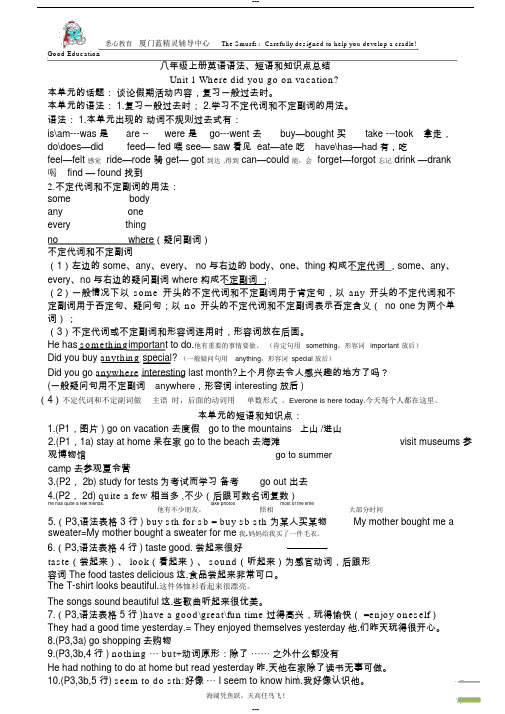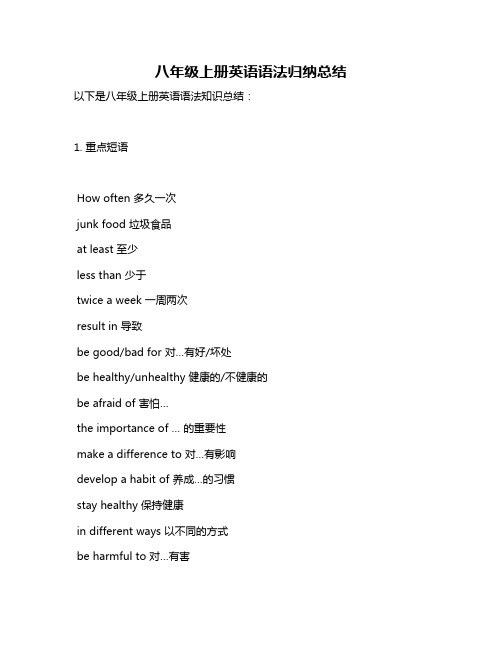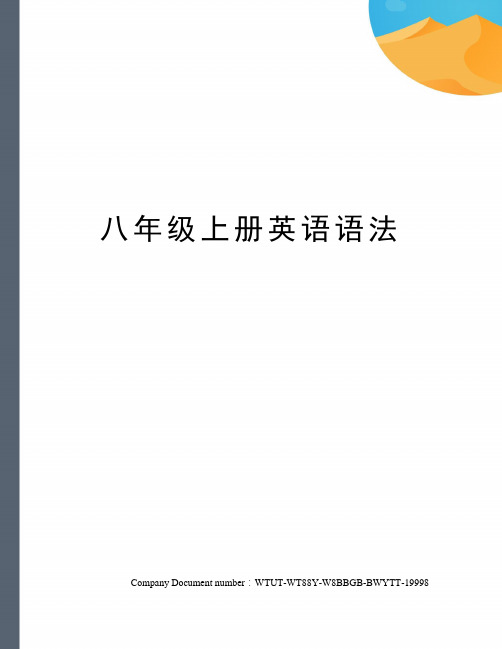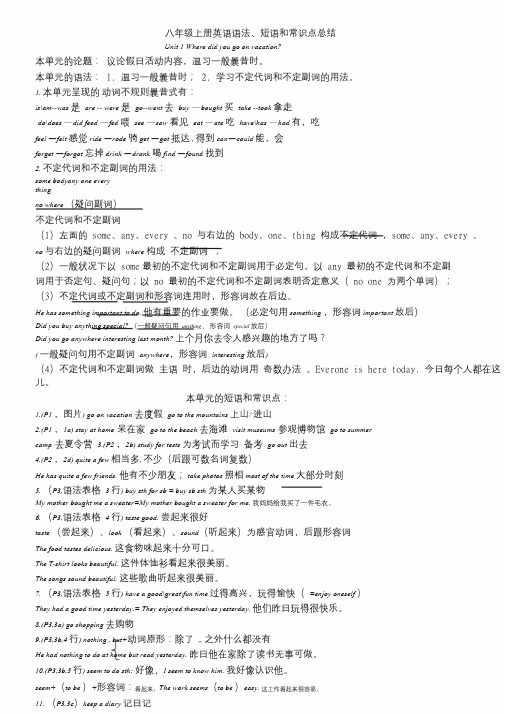(完整版)八年级上册英语语法、短语和知识点总结
(完整word版)八年级上册英语各单元知识点归纳总结

悉心教育 厦门蓝精灵辅导中心The Smurfs :Carefully designed to help you develop a cradle!Good Education八年级上册英语语法、短语和知识点总结Unit 1 Where did you go on vacation?本单元的话题: 谈论假期活动内容,复习一般过去时。
本单元的语法: 1.复习一般过去时; 2.学习不定代词和不定副词的用法。
语法: 1.本单元出现的 动词不规则过去式有: is\am---was 是 are -- were 是 go---went 去 buy —bought 买 take ---took 拿走, do\does —did feed — fed 喂 see — saw 看见 eat —ate 吃 have\has —had 有,吃feel —felt 感觉 ride —rode 骑 get — got 到达 ,得到 can —could 能,会 forget —forgot 忘记 drink —drank 喝 find — found 找到2.不定代词和不定副词的用法: some body any one every thingno where (疑问副词) 不定代词和不定副词(1)左边的 some 、any 、every 、 no 与右边的 body 、one 、thing 构成不定代词 ,some 、any 、every 、no 与右边的疑问副词 where 构成不定副词 ;(2)一般情况下以 some 开头的不定代词和不定副词用于肯定句,以 any 开头的不定代词和不定副词用于否定句、疑问句;以 no 开头的不定代词和不定副词表示否定含义( no one 为两个单词);(3)不定代词或不定副词和形容词连用时,形容词放在后面。
He has something important to do.他有重要的事情要做。
人教版八年级上册英语语法、短语和知识点总结归纳

人教版八年级上册英语语法、短语和知识点总结归纳一、语法1. 一般现在时- 用法:表示经常性或惯性的动作或状态。
- 结构:主语 + 动词原形 (+ 其他成分)- 示例:I play soccer every weekend.2. 一般过去时- 用法:表示过去某个时间点或一段时间内发生的动作或存在的状态。
- 结构:主语 + 动词过去式 (+ 其他成分)- 示例:She watched a movie last night.3. 现在进行时- 用法:表示现在正在发生的动作。
- 结构:主语 + am/is/are + 动词-ing (+ 其他成分)- 示例:They are studying for the exam.4. 现在完成时- 用法:表示动作或状态发生在过去某个时间点,但与现在有关。
- 结构:主语 + have/has + 动词过去分词 (+ 其他成分)- 示例:I have finished my homework.5. 情态动词- 用法:表示能力、意愿、可能性等。
- 常见的情态动词有 can, could, may, might, must, should, ought to 等。
- 示例:He should go to bed early.二、短语1. as well as- 用法:表示两个事物同时存在或发生。
- 示例:She can speak English as well as Chinese.2. in order to- 用法:为了做某事。
- 示例:They woke up early in order to catch the train.3. by the way- 用法:用于引入一个新的话题或问题。
- 示例:By the way, have you seen the latest movie?三、知识点1. 直接引语和间接引语- 直接引语:用引号括起来的原话。
- 间接引语:将直接引语转述为陈述句或疑问句。
(完整版)八年级上册第一单元英语语法、短语和知识点总结

八年级上册英语语法、短语和知识点总结Unit 1 Where did you go on vacati on?本单元的话题:谈论假期活动内容,复习一般过去时。
本单元的语法:1.复习一般过去时;2•学习不定代词和不定副词的用法。
语法: 1•本单元出现的动词不规则过去式有:is\am---was 是;are -- were 是;go---went 去;buy —bought买;take ---took拿走;do\does —did 做;feed—fed喂;see —saw看见;eat --ate 吃;have\has —had 有、吃;feel -felt 感觉;ride —rode 骑;get --got 到达,得到;can — could 能、会;forget —forgot 忘记;drink —drank 喝;find —found 找到2. 不定代词和不定副词的用法:some bodyany oneevery thingno where (疑问副词)不定代词和不定副词(1)左边的some、any、every、no 与右边的body、one、thing 构成不定代词,some、any、every、no与右边的疑问副词where 构成不定副词;(2)—般情况下以some开头的不定代词和不定副词用于肯定句,以any开头的不定代词和不定副词用于否定句、疑问句;以no开头的不定代词和不定副词表示否定含义(no one为两个单词);(3)不定代词或不定副词和形容词连用时,形容词放在后面。
He has something important to do. 他有重要的事情要做。
(肯定句用something,形容词important 放后)Did you buy anything special?(一般疑问句用anything,形容词special放后)Did you go any where interesting last mon th? 上个月你去令人感兴趣的地方了吗?(一般疑问句用不定副词anywhere,形容词interesting 放后)(4)不定代词和不定副词做主语时,后面的动词用单数形式。
八年级上册英语语法归纳总结

八年级上册英语语法归纳总结以下是八年级上册英语语法知识总结:1. 重点短语How often 多久一次junk food 垃圾食品at least 至少less than 少于twice a week 一周两次result in 导致be good/bad for 对…有好/坏处be healthy/unhealthy 健康的/不健康的be afraid of 害怕…the importance of … 的重要性make a difference to 对…有影响develop a habit of 养成…的习惯stay healthy 保持健康in different ways 以不同的方式be harmful to 对…有害the same as 和…一样be sure to 一定要…a balanced diet 均衡的饮食go to the doctor 看医生more than 多于less than 少于the number of … 的数量the importance of … 的重要性2. 重点句型It is+形容词+to do sth. 做某事是……的。
How often + 助动词 + 主语 + 动词 + 其他!对……频率提问。
What do you usually do…?你通常做什么……?I sometimes go to the library. 我有时去图书馆。
How many + 可数名词复数 + are there + 地点?有多少……在某地? How much + 不可数名词 + is there + 地点?有多少……在某地?Why do you want to do sth?你为什么想做某事?I want to do sth because it isfun/difficult/easy/interesting/boring/relaxing. 我想做某事,因为它是有趣的/困难的/容易的/有趣的/无聊的/放松的。
8年级上册英语全部知识点

8年级上册英语全部知识点一、Unit 1 Where did you go on vacation?1. 重点单词。
- anyone pron. 任何人,常用于否定句和疑问句中。
例如:Did you meet anyone interesting?- anywhere adv. 在任何地方,用于否定句和疑问句。
如:I can't find my pen anywhere.- wonderful adj. 精彩的;绝妙的。
可以用来形容经历、事物等,例如:We had a wonderful time on the beach.- few adj. & pron. 不多;很少,修饰可数名词复数,表示否定意义。
例如:Few students like this difficult subject.- quite a few相当多;不少,后接可数名词复数。
例如:There are quite a few books on the shelf.- most adj., adv. & pron. 最多;大多数。
例如:Most students in our class like English.- something pron. 某事;某物,常用于肯定句中。
例如:I have something important to tell you.- nothing pron. 没有什么;没有一件东西,例如:There is nothing in the box.- everyone pron. 每人;人人;所有人,例如:Everyone should follow the rules.- myself pron. 我自己;我本人,是反身代词。
例如:I can look after myself.- yourself pron. 你自己;您自己,例如:You should believe in yourself.2. 重点短语。
八年级上册英语语法

八年级上册英语语法Company Document number:WTUT-WT88Y-W8BBGB-BWYTT-19998八年级上册英语语法、短语和知识点总结Unit 1 Where did you go on vacation本单元的话题:谈论假期活动内容,复习一般过去时。
本单元的语法:1.复习一般过去时;2.学习不定代词和不定副词的用法。
语法:1.本单元出现的动词不规则过去式有:is\am---was是 are -- were是 go---went去 buy—bought买 take ---took拿走, do\does—did feed—fed喂see—saw 看见 eat—ate 吃 have\has—had 有,吃feel—felt感觉 ride—rode骑 get—got到达,得到can—could能,会forget—forgot忘记drink—drank喝find—found找到2.不定代词和不定副词的用法:some bodyany oneevery thingno where(疑问副词)不定代词和不定副词(1)左边的some、any、every、no与右边的body、one、thing构成不定代词,some、any、every、no与右边的疑问副词where构成不定副词;(2)一般情况下以some开头的不定代词和不定副词用于肯定句,以any开头的不定代词和不定副词用于否定句、疑问句;以no开头的不定代词和不定副词表示否定含义(no one为两个单词);(3)不定代词或不定副词和形容词连用时,形容词放在后面。
He has something important to do.他有重要的事情要做。
(肯定句用something,形容词important放后)Did you buy anything special anything,形容词special放后)Did you go anywhere interesting last month上个月你去令人感兴趣的地方了吗(一般疑问句用不定副词anywhere,形容词interesting放后)(4)不定代词和不定副词做主语时,后面的动词用单数形式。
八年级上册第一单元英语语法-、短语和知识点总结

八年级上册第一单元英语语法-、短语和知识点总结一.短语1. stay at home 待在家2. go to New York City 去纽约3. go to summer camp 去夏令营4. go to the mountains 去爬山5. go to the beach 去海边6. visit museums去博物馆7. go on vacation 去度假8. buy something special买一些特别的东西9. study for tests 复习考试10.quite a few 许多的+可数名词复数quitea little 相当多的+不可数名词quitea lot11. keep a diary 写日记=keep diaries12.at a restaurant 在餐馆13. decide to do sth.14. make a decision to do sth15. make up one’s mind to do sth.16. decide on sth. 选定某事17. try doing sth. 尝试做某事18. try to do sth. 试图做某事19. try one’s best to do sth.尽某人全力做某事20. try out for sth. 参加选拔21. try on 试穿22. have a try 试一下23. try paragliding 尝试滑翔伞运动goparagliding 做滑翔伞运动24.feel like a bird 感觉像一只鸟25.feel like that ...26. feel like doing sth. 想要做某事27. ride bicycles to sp. 骑自行车去某地rideto sp.28.enjoy doing sth. 喜欢做某事29.enjoy sth. 喜欢某事30.enjoy oneself 玩得开心=have a good time =have a nice time =have fun31. be like 像32. look like 看起来像33. in the past 在过去34. be different from 与…不同35.tell the difference between A and B. 区分A与B 的不同36. make a difference to ... 对..起作用/有影响37. say 。
八年级上册英语知识点总结.doc

八年级上册英语语法、短语和常识点总结Unit 1 Where did you go on vacation?本单元的论题:议论假日活动内容,温习一般曩昔时。
本单元的语法: 1. 温习一般曩昔时; 2. 学习不定代词和不定副词的用法。
1. 本单元呈现的动词不规则曩昔式有:is\am--was 是are -- were 是go--went 去buy —bought 买take --took 拿走do\does —did feed —fed 喂see —saw 看见eat —ate 吃have\has —had 有,吃feel —felt 感觉 ride —rode 骑 get —got 抵达 , 得到 can—could 能,会forget —forgot 忘掉 drink —drank 喝 find —found 找到2. 不定代词和不定副词的用法:some bodyany one everythingno where (疑问副词)不定代词和不定副词(1)左面的 some、any、every 、no 与右边的 body、one、thing 构成不定代词,some、any、every 、no 与右边的疑问副词where 构成不定副词;(2)一般状况下以 some最初的不定代词和不定副词用于必定句,以 any 最初的不定代词和不定副词用于否定句、疑问句;以 no 最初的不定代词和不定副词表明否定意义( no one 为两个单词);(3)不定代词或不定副词和形容词连用时,形容词放在后边。
He has something important to do. 他有重要的作业要做。
(必定句用 something ,形容词 important 放后)Did you buy anything special? (一般疑问句用anything ,形容词special 放后)Did you go anywhere interesting last month? 上个月你去令人感兴趣的地方了吗?( 一般疑问句用不定副词anywhere,形容词interesting 放后)(4)不定代词和不定副词做主语时,后边的动词用奇数办法。
- 1、下载文档前请自行甄别文档内容的完整性,平台不提供额外的编辑、内容补充、找答案等附加服务。
- 2、"仅部分预览"的文档,不可在线预览部分如存在完整性等问题,可反馈申请退款(可完整预览的文档不适用该条件!)。
- 3、如文档侵犯您的权益,请联系客服反馈,我们会尽快为您处理(人工客服工作时间:9:00-18:30)。
八年级上册英语语法、短语和知识点总结Unit 1 Where did you go on vacation?本单元的话题:谈论假期活动内容,复习一般过去时。
本单元的语法:1.复习一般过去时;2.学习不定代词和不定副词的用法。
2.不定代词和不定副词的用法:(1)左边的some、any、every、no与右边的body、one、thing构成不定代词,some、any、every、no与右边的疑问副词where构成不定副词;(2)一般情况下以some开头的不定代词和不定副词用于肯定句,以any开头的不定代词和不定副词用于否定句、疑问句;以no开头的不定代词和不定副词表示否定含义(no one 为两个单词);(3)不定代词或不定副词和形容词连用时,形容词放在后面。
He has something important to do.他有重要的事情要做。
(肯定句用something,形容词important放后)Did you buy anything special? (一般疑问句用anything,形容词special放后)Did you go anywhere interesting last month?上个月你去令人感兴趣的地方了吗?(一般疑问句用不定副词anywhere,形容词interesting放后)(4)不定代词和不定副词做主语时,后面的动词用单数形式。
Everone is here today.今天每个人都在这里。
本单元的短语和知识点:1. go on vacation去度假go to the mountains 上山/进山2.stay at home呆在家go to the beach去海滩visit museums 参观博物馆go to summer camp 去参观夏令营3. study for tests为考试而学习\备考go out出去4. quite a few相当多,不少(后跟可数名词复数)take photos照相most of the time大部分时间5.buy sth for sb = buy sb sth为某人买某物6. taste good. 尝起来很好taste(尝起来)、look(看起来)、sound(听起来)为感官动词,后跟形容词7.have a good\great\fun time过得高兴,玩得愉快(=enjoy oneself)8. go shopping去购物9. nothing…but+动词原形:除了……之外什么都没有He had nothing to do at home but read yesterday.昨天他在家除了读书无事可做。
10. seem to do sth:好像…I seem to know him.我好像认识他。
seem+(to be)+形容词:看起来…The work seems(to be)easy.这工作看起来很容易。
11.keep a diary记日记12. in+大地方:达到某地(get to +地方:达到某地)arrive at+小地方:达到某地(get的过去式为got)若是arrive和get后跟home、there、here三个地点副词,后面的介词in\at\to必须去掉。
Tom got home yesterday evening=Tom arrived home yesterday evening.昨晚汤姆到家。
13.decide to do sth:决定做某事14. try doing sth.尝试做某事try to do sth.尽力去做某事15. feel like给…的感觉;感受到16. in the past 在过去walk around四处走走enjoy doing sth:喜欢做某事difference(名词,差异,差别)---- different(形容词,不同的)18.start doing sth:开始做某事(= start to do sth)19.19.over an hour一个多小时(over超过,多余= more than)20. too many 太多,后接可数名词复数。
too much 太多,后跟不可数名词,修饰动词作状语。
much too 太,后跟形容词或副词,分辨三者的口诀:too much, much too, 用法区别看后头:much 后接不可数,too 后修饰形或副。
too many 要记住,后面名词必复数。
21. because of 因为,后接名词、代词或动名词(即动词+ing),不能接句子。
because因为,后跟句子。
He was late for school because of getting up late.他因为起晚而上学迟到。
(get为动词)= He was late for school because he got up late.22. enough(足够的)与名词连用,一般放在名词前He has enough money .23. enough(足够的)与形容词或副词连用,enough放在后面。
He is old enough to go to school.24. doing sth.忘记已经做过某事(已经做完)Forget to do sth.忘记去做某事(还未做)(forget的过去式为forgot)25. so+形容词+that+句子:如此…以至于…too+形容词+to do sth:太…以至于不能…形容词+enough to do sth:足够…能够做某事(注意三个句型有时可以互换)He is so young that he can′t go to school.= He is too young to go to school.= He isn′t old enough to go to school.Unit 2 How often do you exercise?本单元的话题:谈论生活习惯,复习一般现在时。
本单元的语法:1.复习一般现在时;2.学习表示频率副词的用法。
主要频率副词的等级排序:always(总是) > usually (通常) > often(经常) > sometimes(有时) > hardly ever(很少) > never(从不)这些副词在句子中的位置,一般放在助动词、be动词或情态动词之后,行为动词之前。
即:“行”前“助(系)”后。
Peter is always late for school. Peter上学总是迟到。
I usually do my homework in the evening. 我通常在晚上做作业。
提问always, sometimes, twice a day 等频率副词,用How oftenI watch TV every day.我每天都看电视→How often do you watch TV?(你多长时间看一次电视?)本单元的短语和知识点:1.on weekends在周末go to the movies去看电影help with housework帮助做家务how often多久一次hardly ever几乎从不2.once a week每周一次twice a week每周两次every day每天use the Internet用互联网be free有空Are you free on weekends?你周末有空吗?4.stay up late熬夜at least至少go to bed early早点睡觉play sports进行体育活动5.after school 放学后6.want sth:需要某物He wants a new pen.他想要一支新钢笔。
want to do sth:想做某事He wants to watch TV after school.放学后他想去看电视。
want sb to do sth:让某人做某事My mother wants me get up early.妈妈让我早起。
7.be good for对……有好处be bad for 对……有害处8. play computer games打电子游戏go camping去野营9.ask sb about sth:问某人某事My parents often ask me about my study.我的父母经常问我的学习情况。
10. in one’s spare time在某人业余时间He studies English in his spare time.11.(P13,2b)”数字+percent of+名词”做主语时,后面的单词取决于名词的情况。
若名词为复数,后面的动词用复数形式;若名词为单数或不可数名词,后面的动词用单数形式。
In our class ,twenty of students are boys. Thirty of water is dirty.12.not…at all:一点儿也不(not构成否定句)I don’t like the movie at all.13.go online上网=surf the Internet 14.the answer to+名词:…的答案16.the (best) way to do sth: 做某事的(最好)方式The best way to learn English is speaking English.学习英语的最好方法是说英语.17.such as比如(后跟名词或名词短语)for example 例如(后跟句子)He likes fruits,such as apples,bananas and so on.他喜欢水果,例如苹果、香蕉等。
He has some good ways to study English,for example ,he often listens to tapes.19.more than (=over)超过,多余go to the dentist去看牙医Unit 3 I'm more outgoing than my sister.本单元的话题:谈论事物对比,学习形容词比较级。
本单元的语法:学习形容词比较级。
(语法:见课本第113页至115页)本单元的短语和知识点:1.play+the +乐器play the drums打鼓比较play +球类play basketball打篮球both…and…两者都(后面的动词用复数形式) Both Tom and Jim are students.3.be good at+名词\代词\V ing:擅长,在某方面做得好7.be like:像…The books are like friends.书像朋友。
